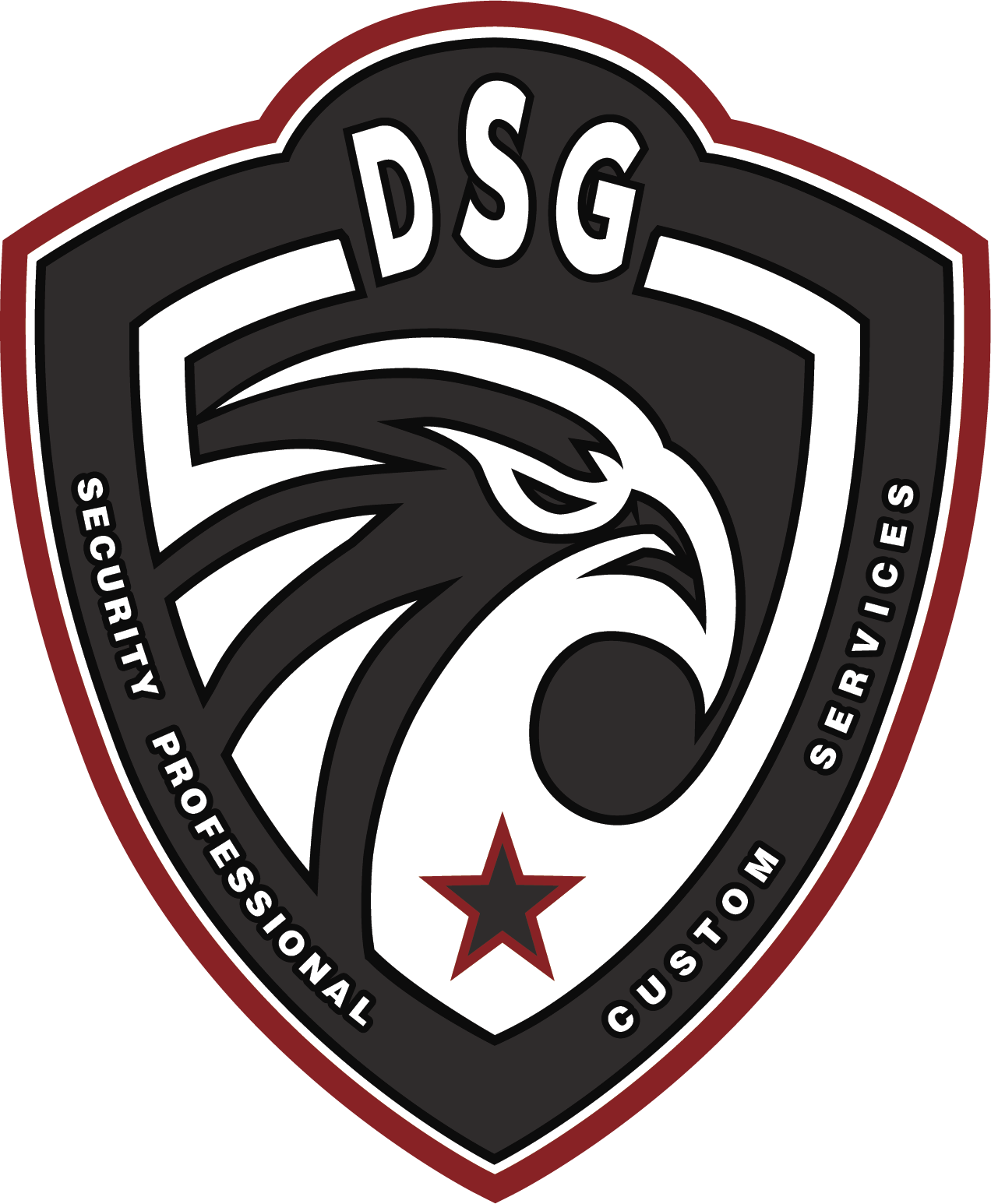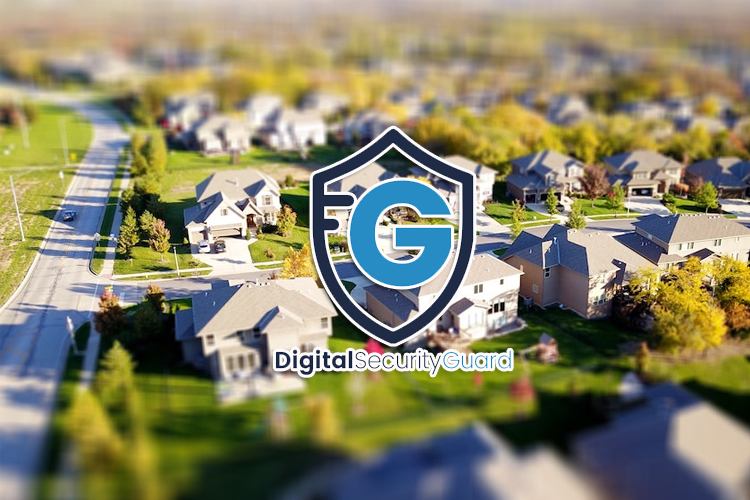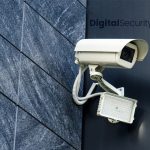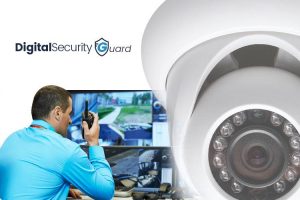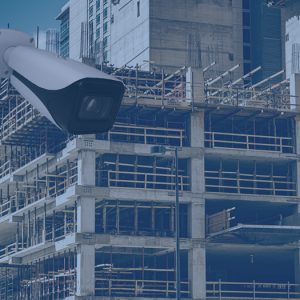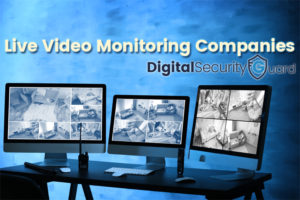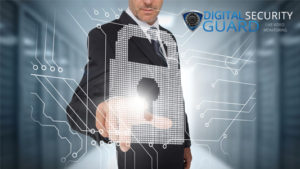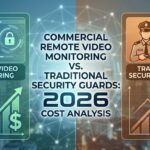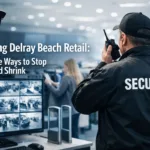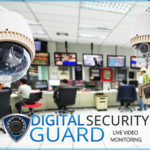The on-site security guard at your apartment gate costs $120,000-150,000 annually. They work 8-hour shifts, take breaks, call out sick, and can only monitor one entrance at a time. Meanwhile, your residents complain about long wait times, delivery drivers bypass security, and unauthorized visitors slip through during shift changes.
Virtual gate guard services for apartments solve these challenges while slashing security costs by 80-90%. Through HD cameras, two-way audio systems, and 24/7 professional monitoring, your community gets continuous entry security without the expenses and limitations of traditional guards.
This comprehensive guide explains how virtual gate guard services for apartments work, what they cost, and why property managers across the country are making the switch. Whether you manage a 50-unit garden apartment or a 500-unit luxury high-rise, you’ll discover how modern technology delivers better security at dramatically lower costs.
Traditional Gate Guard vs. Virtual Gate Guard: At a Glance
| Feature | Traditional Gate Guard | Virtual Gate Guard |
|---|---|---|
| Coverage Hours | 8-12 hours per shift | 24/7/365 continuous |
| Annual Cost | $120,000-150,000 | $18,000-30,000 |
| Breaks/Downtime | Lunch, bathroom, shift changes | Zero downtime |
| Entry Points Monitored | One location only | All entry points simultaneously |
| Response Time | 3-10 minutes (must walk to incident) | 15-30 seconds (immediate) |
| Documentation | Handwritten logs, varies by guard | Automatic video/timestamp logs |
| Sick Days/Vacations | Requires replacement guards | No coverage gaps ever |
| Performance Consistency | Varies by individual, fatigue factor | Consistent professional standards |
| Emergency Coordination | Radio/phone to dispatch | Direct law enforcement contact + video |
| First Year Investment | $120,000-150,000 | $42,000-77,000 |
| Years 2+ Annual Cost | $125,000-160,000 | $14,400-21,600 |
What Are Virtual Gate Guard Services for Apartments?
Virtual gate guard services for apartments replace on-site personnel with professionally monitored HD camera systems and two-way audio intercoms. Instead of a person sitting in a booth, licensed security professionals monitor your entry points from a remote command center—screening visitors, managing deliveries, controlling access, and coordinating emergency response 24/7/365.
Core Components
HD Camera Systems
4K resolution cameras capture clear images of every vehicle, license plate, and visitor approaching your property. Multiple camera angles eliminate blind spots while providing visual documentation for every entry and exit.
Two-Way Audio Intercoms
Professional security operators communicate directly with visitors, delivery drivers, and residents through high-quality audio systems. Crystal-clear communication ensures proper screening without the need for physical presence.
Access Control Integration
Virtual guards coordinate with your existing gate systems, barrier arms, and smart locks. They can remotely open gates for authorized residents while denying access to unauthorized visitors.
License Plate Recognition
Advanced analytics automatically read and log license plates, creating searchable databases of approved vehicles. This speeds entry for residents while flagging unknown or suspicious vehicles for additional screening.
Real-Time Monitoring
Unlike traditional guards who can be distracted or tired, professional monitoring teams maintain constant vigilance. Multiple guards share monitoring duties, ensuring someone is always actively watching your property.
How Virtual Gate Guard Services for Apartments Work
The Visitor Screening Process
Step 1: Vehicle Approaches Gate
HD cameras capture the vehicle and license plate. License plate recognition automatically checks against resident databases. Known resident vehicles proceed with minimal delay.
Step 2: Unknown Vehicle Identification
When an unknown vehicle approaches, the system alerts the remote security operator. The guard reviews the live video feed and initiates two-way audio communication.
Step 3: Visitor Verification
The security professional asks for visitor name, purpose, and destination. They contact the resident via phone or intercom to verify the guest is expected. Only after confirmation do they grant access.
Step 4: Entry Logging
Every vehicle entry is automatically logged with timestamp, license plate image, video recording, and visitor information. This creates comprehensive documentation for security incidents or resident inquiries.
Step 5: Exit Monitoring
Virtual guards also monitor exits, noting how long visitors stayed and ensuring no suspicious activity occurs during departure.
Delivery Management
Virtual gate guard services for apartments excel at managing the constant stream of Amazon, FedEx, UPS, and food delivery drivers. Guards can:
- Verify delivery company credentials through visual confirmation
- Direct drivers to designated package drop zones
- Coordinate with leasing office staff for signature-required deliveries
- Monitor drivers to ensure they don’t access unauthorized areas
- Prevent “piggybacking” where unauthorized vehicles follow delivery trucks
Emergency Response Coordination
When security incidents occur, virtual guards immediately:
- Contact law enforcement with detailed descriptions and video evidence
- Guide first responders to exact locations within the property
- Secure other entry points to prevent escape
- Coordinate with on-site staff or emergency personnel
- Maintain video documentation for investigations
According to research from the <a href=”https://bja.ojp.gov/” target=”_blank” rel=”nofollow”>Bureau of Justice Assistance</a>, properties with actively monitored surveillance systems experience 50% fewer security incidents compared to those with passive camera systems.
Virtual Gate Guard vs. Traditional Security Guards
Coverage and Availability
Traditional Guard Limitations:
- Works 8-12 hour shifts only
- Requires multiple guards for 24/7 coverage
- Takes breaks, lunches, and bathroom breaks
- Calls out sick or quits without notice
- Can monitor only one entrance at a time
- May become complacent or distracted
Virtual Guard Advantages:
- True 24/7/365 monitoring without breaks
- Multiple guards share monitoring responsibilities
- Simultaneous monitoring of all entry points
- Never calls out sick or quits
- Maintains consistent vigilance
- Fresh eyes reviewing your property constantly
Cost Comparison
Traditional Guard Costs (Annual):
- Base salary: $35,000-45,000 per guard
- Benefits and insurance: $15,000-20,000
- Multiple guards for 24/7: $120,000-150,000 total
- Guard booth/facilities: $5,000-10,000
- Training and uniforms: $3,000-5,000
- Total First Year: $128,000-165,000
- Ongoing Annual: $125,000-160,000
Virtual Guard Costs (Annual):
- Professional monitoring: $800-1,500/month
- Equipment and installation: $15,000-30,000 (one-time)
- System maintenance: $1,000-2,000/year
- Total First Year: $25,600-48,000
- Ongoing Annual: $10,600-20,000
Annual Savings: $103,000-145,000 (82-88% reduction)
Performance and Reliability
Traditional guards face human limitations that impact performance. Studies show guard attentiveness drops dramatically after the first hour of a shift. Virtual gate guard services for apartments eliminate these concerns through:
Constant Fresh Perspective
Multiple security professionals rotate monitoring duties every 2-4 hours. Each brings fresh attention to your property’s surveillance feeds.
Technology-Enhanced Vigilance
AI analytics highlight unusual activity for human review. Guards respond to system alerts rather than trying to spot issues in hours of video.
Documented Performance
Every interaction is recorded and reviewable. Management can verify guards are following protocols and providing quality service.
No Interpersonal Issues
Virtual guards can’t have personal conflicts with residents, won’t accept bribes, and maintain professional boundaries without exception.
Benefits for Apartment Communities
Enhanced Resident Safety
Virtual gate guard services for apartments provide security benefits that traditional guards simply cannot match:
Multi-Point Surveillance
Monitor all entrances, parking areas, and amenity spaces simultaneously. Traditional guards can only watch one location.
Instant Emergency Response
Direct communication with law enforcement and emergency services. Guards provide real-time information and video evidence that speeds response times.
Reduced Crime Deterrence
Visible cameras combined with active monitoring deter criminal activity. Research from the <a href=”https://www.urbaninstitute.org/” target=”_blank” rel=”nofollow”>Urban Institute</a> shows surveillance systems reduce property crime by up to 50% when properly implemented.
After-Hours Protection
Many apartment crimes occur between 11 PM and 6 AM when traditional guard presence is weakest. Virtual guards maintain peak alertness around the clock.
Improved Property Management
Comprehensive Activity Logs
Automatically generated reports show all entries, exits, deliveries, and security events. No more relying on guard shift reports that may be incomplete or inaccurate.
Visitor Management
Digital visitor logs allow residents to pre-register guests. The system alerts guards when expected visitors arrive, streamlining the entry process.
Package Delivery Coordination
Guards direct delivery drivers to designated zones, reducing package theft and ensuring parcels reach secure locations.
Amenity Access Control
Monitor pool, gym, and clubhouse areas. Guards can verify resident authorization and prevent unauthorized use that leads to liability issues.
Increased Property Value
Properties with modern security systems command higher rents and see improved resident retention. Prospective residents specifically ask about security features during tours.
Higher Rental Rates
Properties with comprehensive security justify $50-150/month premium rents. Across a 200-unit property, this generates $120,000-360,000 in additional annual revenue.
Improved Retention
Residents who feel safe renew leases at higher rates. Each renewal saves $1,000-3,000 in turnover costs (marketing, make-ready, vacancy).
Competitive Advantage
Virtual gate guard services for apartments become a key marketing differentiator. Property managers report increased tour-to-lease conversion when they can demonstrate advanced security.
Reduced Insurance Costs
Many insurance providers offer premium reductions for properties with professionally monitored security systems. Discounts of 5-15% are common, saving thousands annually.
Implementation: What to Expect
Site Assessment
Professional security consultants evaluate your property to determine optimal camera placement, intercom locations, and access control integration points. They assess:
- Number and layout of entry/exit points
- Existing infrastructure and systems
- Lighting conditions and sight lines
- Network connectivity and bandwidth
- Specific community security concerns
Equipment Installation
Installation typically takes 3-5 days for most apartment communities:
Day 1-2: Camera and intercom installation at gates and entry points
Day 3: Network configuration and system integration
Day 4: Testing and quality assurance
Day 5: Staff training and go-live
The process causes minimal disruption to resident activities. Installers work efficiently and maintain a professional presence throughout.
System Training
Your leasing office staff, maintenance team, and management receive comprehensive training on:
- How to pre-register expected visitors
- Emergency override procedures
- Accessing video footage for investigations
- Coordinating with virtual guards
- Resident communication about the new system
Resident Communication
Successful implementations include clear resident communication explaining:
- How the virtual guard system works
- Benefits for resident safety and convenience
- What to expect when visitors arrive
- How to pre-register frequent guests
- Privacy policies and camera coverage areas
Most residents respond enthusiastically to virtual gate guard services for apartments once they understand the enhanced security and convenience.
Common Questions About Virtual Gate Guard Services for Apartments
“What happens if internet goes down?”
Modern systems include redundant connectivity:
- Primary broadband connection
- Cellular backup connection (4G/5G)
- Local recording continues during outages
- Automatic alert when connectivity restored
Most systems never experience meaningful downtime. When brief outages occur, local recording ensures no security gaps.
“Can virtual guards really deter crime?”
Research consistently shows that monitored surveillance deters crime more effectively than passive cameras. Studies by the <a href=”https://www.ncjrs.gov/” target=”_blank” rel=”nofollow”>National Criminal Justice Reference Service</a> indicate active monitoring reduces property crime by 45-60%.
Virtual guards can:
- Issue verbal warnings via two-way audio
- Activate lights and sirens
- Immediately contact law enforcement with video evidence
- Track suspects and guide police response
This proactive approach prevents crimes rather than merely recording them.
“How do residents access the property?”
Residents use their existing methods—key fobs, transponders, access codes, or smartphone apps. Virtual guards only intervene when unknown vehicles or visitors approach. Residents experience faster, more convenient entry than with traditional guards.
“What about privacy concerns?”
Cameras monitor only common areas—entrances, parking, and amenity spaces. Private residential areas are never recorded. All footage is encrypted and access-controlled. Systems comply with state and federal privacy regulations.
Virtual gate guard services for apartments provide more consistent privacy protection than traditional guards, who may gossip or share resident information inappropriately.
“Can the system scale as we grow?”
Virtual guard systems easily expand as your property adds buildings, entrance points, or amenities. Adding new cameras costs far less than hiring additional security personnel. The centralized monitoring infrastructure accommodates growth without proportional cost increases.
Choosing a Virtual Gate Guard Provider
Key Selection Criteria
Professional Monitoring Standards
Look for providers with licensed security professionals, not just camera technicians. Ask about:
- Guard training and certification requirements
- Background check policies
- Quality assurance procedures
- Industry experience
Technology Capabilities
Evaluate the equipment and systems:
- Camera resolution and night vision performance
- Audio quality for clear communication
- License plate recognition accuracy
- Integration with your existing systems
Customer Service
Test their responsiveness:
- 24/7 technical support availability
- Average response time for issues
- Escalation procedures for emergencies
- Account management and regular reviews
Cost Transparency
Demand clear, all-inclusive pricing:
- No hidden equipment fees
- No activation or setup charges
- Clear explanation of what’s included
- Flexible contract terms
Digital Security Guard provides transparent pricing and month-to-month contracts—rare in an industry dominated by long-term commitments and hidden fees. Learn more about our virtual security guard services.
Real Results from Apartment Communities
Case Study: 300-Unit Garden Apartment Complex
Previous Setup: Two traditional guards covering 16 hours daily (6 AM – 10 PM). No overnight security.
Annual Traditional Guard Cost: $85,000
Virtual Guard Implementation:
- 4 HD cameras at two entry gates
- Two-way audio intercoms
- License plate recognition
- Access control integration
- 24/7 professional monitoring
Annual Virtual Guard Cost: $18,000
Results After 12 Months:
- 87% reduction in security costs
- Zero unauthorized after-hours entries
- Package theft eliminated
- Resident satisfaction scores increased 34%
- Renewal rates improved from 68% to 79%
- Property able to justify $75/month rent increase
Case Study: 450-Unit High-Rise Apartments
Previous Setup: Three traditional guards (24/7 coverage) plus weekend relief guard.
Annual Traditional Guard Cost: $156,000
Virtual Guard Implementation:
- 6 HD cameras (main entrance, parking garage, two side entrances)
- Video intercom system integration
- Access control coordination
- Visitor management portal
- 24/7/365 monitoring
Annual Virtual Guard Cost: $24,000
Results After 12 Months:
- 85% reduction in security costs ($132,000 annual savings)
- Visitor processing time reduced from 3-5 minutes to 30-45 seconds
- Zero security breaches during implementation period
- $132,000 savings reinvested in property improvements
- Improved competitive position in local market
Getting Started with Virtual Gate Guard Services for Apartments
Your Implementation Roadmap
Step 1: Free Security Assessment (Week 1)
Professional consultants evaluate your property, identify vulnerabilities, and design a customized solution. This assessment considers your specific challenges, resident demographics, and budget parameters.
Step 2: Proposal and Budget Approval (Week 2-3)
Receive a detailed proposal with equipment specifications, installation timeline, and transparent pricing. Review with your ownership group or board for approval.
Step 3: Installation (Week 4-5)
Professional technicians install cameras, intercoms, and system infrastructure with minimal disruption to residents.
Step 4: Testing and Training (Week 5-6)
Comprehensive system testing ensures everything works flawlessly. Staff receive hands-on training for daily operations and emergency procedures.
Step 5: Resident Communication (Week 6)
Inform residents about the new system through emails, newsletters, and lobby signage. Address questions and highlight the security benefits.
Step 6: Go-Live and Monitoring Begins
Virtual guards begin 24/7 monitoring. Initial weeks include extra attention to ensure smooth operations and address any fine-tuning needs.
Most properties transition from traditional guards to virtual gate guard services for apartments in 6-8 weeks from initial contact to full operation.
Take the Next Step
Virtual gate guard services for apartments deliver superior security at 80-90% lower cost than traditional guards. With 24/7 professional monitoring, comprehensive coverage, and advanced technology, your community gains protection that traditional guards simply cannot match.
The question isn’t whether virtual gate guard services work—thousands of apartment communities prove they do. The question is whether you’re ready to cut security costs while improving resident safety and satisfaction.
Get Your Free Security Assessment:
Digital Security Guard provides professional virtual gate guard services for apartments nationwide. Our licensed security professionals monitor your property 24/7/365 through HD cameras and two-way audio systems—eliminating the costs and limitations of traditional guards.
What You’ll Receive:
- Comprehensive property security evaluation
- Customized system design for your community
- Transparent pricing with no hidden fees
- ROI analysis showing your exact savings
- Implementation timeline and process overview
Call (800) 829-7459 or request your free assessment online
Learn More About Virtual Security Solutions
Related Resources:
- Complete guide to virtual security guard services
- How virtual security guards work
- Virtual security guard pricing and costs
- Security guard alternatives comparison
Connect With Us:
- Website: digitalsecurityguard.com
- Facebook: facebook.com/digitalsg
- Phone: (800) 829-7459
Digital Security Guard provides virtual gate guard services for apartments nationwide, delivering 24/7 professional monitoring at 80-90% lower cost than traditional security guards. Our licensed security professionals use HD cameras and two-way audio to screen visitors, manage deliveries, and coordinate emergency response—providing superior protection for your residents and property. Contact us at (800) 829-7459 for your free security assessment and discover how much you can save.
